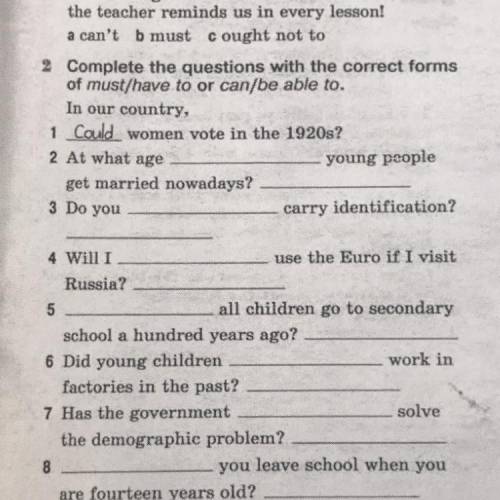2 Complete the questions with the correct forms of must/have to or can/be able to.
In our country,
1 Could women vote in the 1920s?
2 At what age
young people
get married nowadays?
carry identification?
3 Do you
4 Will I
use the Euro if I visit
Russia?
5
all children go to secondary
school a hundred years ago?
6 Did young children
work in
factories in the past?
7 Has the government
solve
the demographic problem?
8
you leave school when you
are fourteen years old?
look

Другие вопросы по теме Английский язык
Популярные вопросы
- На нитях, закрепленных в одной точке, подвешены два шарика массой 6 г...
1 - 630140 : 70*70+60*754-11223: 87 расставить порядок действия и решить...
3 - Вкакой стране сформировался пейзаж?...
3 - Заменить прилагательные противоположными по смыслу словами: ясное небо,...
3 - Общая масса трех кусков гранита 156 кг. кусок серого гранита тяжелее...
1 - Найдите длину вектора заданного координатами а(2; 3) b(-3; -5)...
2 - Кто сможет решить 4 и 6 ? это ! заранее !...
3 - Всмесе кислорода и углекислого газа одна треть обьема приходится на кислород,...
3 - Что значит слова нарцисс саронский ? песн.2: 1...
3 - Каким цветом обозначают железо на карте полезных ископаемых...
1
During the 1920s, the right for women to vote was granted to them in many countries. This was a significant milestone in women's rights and gender equality. In our country, women were also able to exercise their right to vote during this time. Therefore, the correct form to use in this question is "could."
2 At what age can young people get married nowadays?
The legal age for marriage varies from country to country. In our country, young people are allowed to get married once they reach the age of consent, which is generally 18 years old. However, there might be certain exceptions or special circumstances that could allow individuals to get married at a younger age, such as parental consent or judicial approval. Hence, the correct form to use in this question is "can."
3 Do you have to carry identification?
Carrying identification is an important aspect of personal safety and security. In some situations, it is necessary to provide identification when requested by authorities, such as when traveling, entering certain premises, or engaging in legal transactions. However, the requirement to carry identification might also depend on specific laws or regulations within our country. Therefore, the correct form to use in this question is "have to."
4 Will I be able to use the Euro if I visit Russia?
The currency used in Russia is the Russian Ruble, not the Euro. Therefore, when visiting Russia, it would not be possible to use the Euro for transactions. Instead, one would need to exchange their currency for Russian Rubles in order to make purchases or complete financial transactions. Hence, the correct form to use in this question is "be able to."
5 Could all children go to secondary school a hundred years ago?
The accessibility and availability of education have significantly changed over the past century. A hundred years ago, the educational system might have been different, and not all children had the opportunity to attend secondary school. Factors such as social class, gender, and economic conditions often limited access to education. Therefore, the correct form to use in this question is "could."
6 Did young children work in factories in the past?
In the past, child labor was common in many countries, including our own. Children were often forced to work in factories and other hazardous environments due to prevalent economic conditions and societal norms. However, over time, awareness of the negative impact of child labor has increased, leading to the implementation of laws and regulations prohibiting such practices. Hence, the correct form to use in this question is "did."
7 Has the government solved the demographic problem?
The issue of a demographic problem can have many different contexts and resolutions. Without specific information regarding the demographic problem being referred to, it is difficult to determine whether the government has completely solved it. Demographic problems can range from issues such as population decline, aging population, or imbalances in workforce distribution. It would require a comprehensive analysis of the specific problem to assess the government's efforts and solutions. Hence, the correct form to use in this question is "has."
8 Do you leave school when you are fourteen years old?
The age at which individuals leave school varies from country to country and depends on their educational system. In our country, the minimum age for leaving school is generally higher than fourteen years old. However, there might be exceptions or different educational paths that individuals can choose, such as vocational training programs. Therefore, the correct form to use in this question is "do."